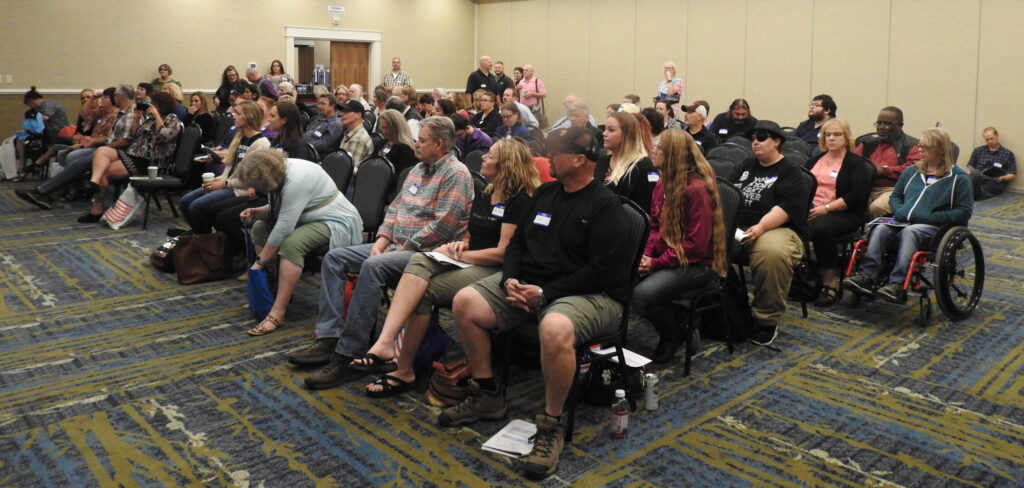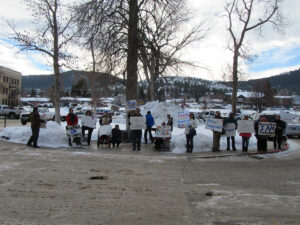We are a network of individuals who are on the path of recovery.
We identify as being in recovery from mental health, substance abuse and or addiction struggles. Together we share information, provide peer support, advocate with a united voice and improve the system. We come from places all across Montana, with different stories and experiences but together we make a difference. This is the Recovery Movement in Montana.



Art Heals bring you a monthly art project to support your recovery.
Advocacy
 Standing up for what we believe is right, having a voice, making choices in recovery, and sharing our own recovery story are some of the things that make up advocacy and self-advocacy.
Standing up for what we believe is right, having a voice, making choices in recovery, and sharing our own recovery story are some of the things that make up advocacy and self-advocacy.
Let’s start with self-advocacy which refers to an individual’s ability to effectively communicate, convey, negotiate, or assert his/her own interests, desires, needs, or rights. It involves making informed decisions and taking responsibility for those decisions (Van Reusen et al., 1994).
Knowing yourself and your strengths, needs, and interests is the first step toward advocating for your rights. Once we begin to find our way on the path of recovery, we may want to begin to advocate for ourselves with those around us—peer supporters, friends, family, service providers, and doctors. These conversations may be difficult, but having them is vital to your recovery. Remember, you are the expert on yourself.
It may be that prior to getting on the path to recovery, others were making decisions for you or acting in what they believed to be your best interest. Now may be the time for you to let others know what you believe to be in your best interest. You may find yourself in the process of taking control and making decisions affecting your life and perhaps others’ lives. This process of self-determination means making informed choices, problem solving, setting and attaining goals—essentially being a self-advocate.
Advocacy or advocating for others may be something you are interested in doing. Advocating for another person isn’t about acting in a person’s perceived best interest, but it is standing with a person to ensure they are able to articulate and obtain what they want or need. Perhaps you may consider speaking up and advocating for various changes in the services in your community.
Here are a few examples of advocacy:
- Speak to your legislature or a special committee.
- Get involved with an advocacy group or organization.
- Share your recovery story to support others in recovery.
- Whether advocating for yourself, for others, for your community, or as part of an organization, advocacy is very self-empowering. You can make a real difference in your life, the lives of others, and even the community.
- Reach out to Montana’s Peer Network and share your recovery story on one of our “Recovery Talks” podcasts.
Advancing Advocacy Blog
Therapy Awareness
Forgiveness should be a journey, not a destination. What I mean by that is, whether we need to forgive ourselves, friends/family, or people who have wronged us in our lives, that can be a very difficult task. That physical pain we felt, the emotional toll we went through, and the way our bodies grasped those feelings and held onto them tight, can feel like something you will truly never get over. The old saying goes, “Time heals everything.” Well, it sure doesn’t. The reason I say this is because over time, life keeps throwing us curveballs, or as experts, unlike myself like to call it, trauma. It starts stacking inside of us and piling up like deskwork in our brains. When this happens, we are walking through life with unresolved hurt inside of us, and then turn around and project it onto others. So, the very things that hurt us in the beginning, we are now doing those same things to the ones we love, friends, our children, etc.
Embracing Peer-Based Work
Embarking on the path of peer-based work, my journey began with volunteering in groups and local recovery meetings. Guided by mentors who have walked the path of recovery themselves, I learned the importance of striking a balance between receiving peer support and giving back through volunteering. This journey has led me to immerse myself in various councils, committees, and boards, contributing my time and skills to initiatives close to my heart.
Realizing Recovery Blog
What Recovery Means to Me
The meaning of recovery to me has evolved over the years as I have evolved. I remember sitting in county jail thinking, “If I can just not get high, get a job somewhere doing anything, and an apartment, that will be enough for me.” My expectations of myself and what life could look like were low. Honestly, if I would have achieved only that, it still would have been recovery, it still would have been a significantly better life than when I was at my lowest.
The Art of Recovery
Recovery allows me to reframe the artwork that is my life. My addiction took that piece of artwork and buried it in the basement of my soul. Through the years, I piled boxes of trauma over the top of it, it gathered dust and lost all its value.
Recovery is Life
Recovery is the beginning of positive change and evolving into the spirit and human being an individual was meant to be. Its the bond and balance of body, mind, and soul. It is the discovery of who Creator really made an individual to be.
Relationships in Recovery
I believe that relationships are what gives each of our lives purpose. The connection that each of us have with the people in our lives is what gives us the ability have the emotions that we get to experience. I also believe that we get to have a relationship with ourselves.





